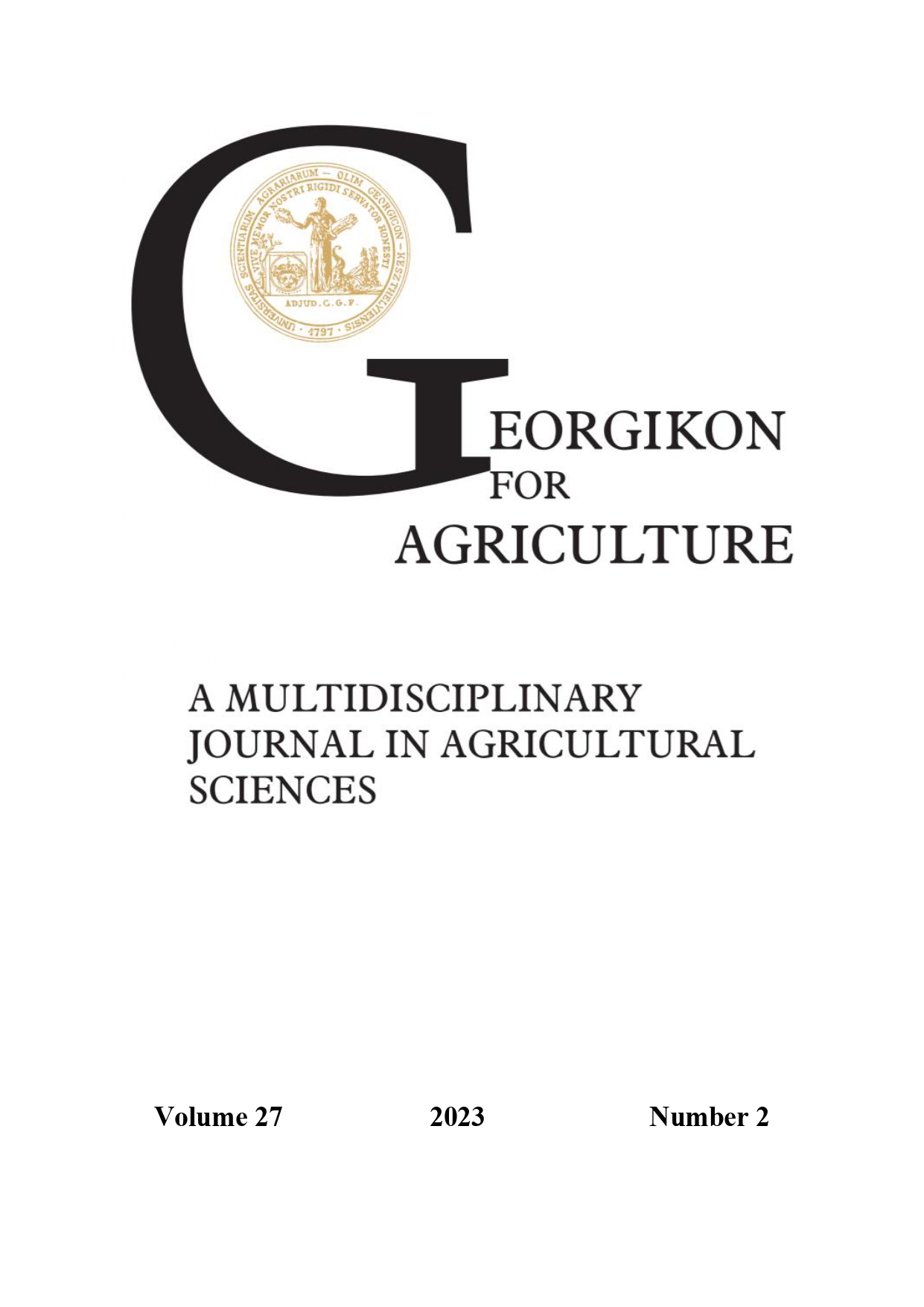Analysis of information content on hypertemporal UAV images
Keywords:
UAV, hypertemporal, multispectral, plant protection, classificationAbstract
Today, the data provided by drones extremely useful information for professionals. The processing of large data sets collected by UAVs, on the other hand, may require different methodological elements based on the properties of the sensors placed in each camera system. The sensors placed on the carrier devices can significantly influence not only the collection of data, but also the evaluations appropriate for the given purpose. The data sets created by the sensors can be characterized by different geometric, spectral and temporal resolutions for each camera system. We can characterize the information content of the spectral layers of the Bayer-type CFA filter (Color Filter Array) and Global Shutter sensors by calculating information-theoretic entropy. If we have different spectral, geometric, and temporal data series available after the recording, the processing can be done by processing the data series separately or together. In the case of aerial photographs with different characteristics, data fusion procedures can also be used in the data processing process, which poses many challenges for remote sensing specialists. Properly performed data fusion can further increase the potential of the data. In our article, we present the information content-based processing of our environmental protection aerial surveys carried out in the sample area of Kis-Balaton. During image processing, we performed geodesic-based and pattern-matching-based integration of the data, the results of which are also presented with an entropy-based analysis of the images. We extended our investigations to the most frequently used image classification procedures in practice, and we also present the analysis of the error matrices related to the analysis of the result images of the procedures and the obtained Kappa indices. All of these were done in the manner described above because they do not require unique solutions and farmers, or users can do them even with basic knowledge.
References
Adão, T., Hruška, J., Pádua, L., Bessa, J., Peres, E., Morais, R., and Sousa, J. 2017. Hyperspectral Imaging: A Review on UAV-Based Sensors, Data Processing and Applications for Agriculture and Forestry. Remote Sensing 9 (11), 1110. https://doi.org/10.3390/rs9111110
Bácsatyai L., Márkus I. 2001. Fotogrammetria és távérzékelés. Kézirat, Sopron.
Carlson, T. N., and Ripley, D. A. 1997. On the relation between NDVI, fractional vegetation cover, and leaf area index. Remote Sensing of Environment. 62 (3), 241–252. https://doi.org/10.1016/s0034-4257(97)00104-1
Clevers, J. G. P. W., de Jong, S. M., Epema, G. F., van der Meer, F., Bakker, W. H., Skidmore, A. K., and Addink, E. A. 2001. MERIS and the red-edge position. International Journal of Applied Earth Observation and Geoinformation. 3 (4), 313–320. https://doi.org/10.1016/s0303-2434(01)85038-8
Enyedi, A. – Kozma-Bognár, V. – Berke, J. 2016. Comparison of imaging algorithms for remote sensing based on content and image structure, Remote Sensing Technologies & GIS Journal.6 (6), 464-475.
Európai Unió Tanácsa 2009. A Tanács 428/2009/EK rendelete a kettős felhasználású termékek kivitelére, transzferjére, brókertevékenységére és tranzitjára vonatkozó közösségi ellenőrzési rendszer kialakításáról. Az Európai Unió Hivatalos Lapja. L 134/1. https://eur-lex.europa.eu/legal-content/HU/TXT/HTML/?uri=CELEX:32009R0428&from=en#ntr1-L_2009134HU.01000101-E0001
Feng, H., Tao, H., Zhao, C., Li, Z., and Yang, G. 2021. Comparison of UAV RGB Imagery and Hyperspectral Remote-sensing Data for Monitoring Winter-wheat Growth. https://doi.org/10.21203/rs.3.rs-170131/v1
Kevi, A., Berke J., Kozma-Bognár V. 2023. Comparative analysis and methodological application of image classification algorithms in higher education. Journal of Applied Multimedia 1./XVIII./2023 https://doi.org/10.26648/JAM.2023.1.002.
Kleynhans, W. 2011. Detecting land-cover change using MODIS time-series data. PhD Thesis. University of Pretoria. Pretoria.
Kozma-Bognár V. 2012. Hiperspektrális felvételek feldolgozásának és mezőgazdasági alkalmazásának vizsgálata. PhD Értekezés. Pannon Egyetem Állat- és Agrárkörnyezet-tudományi Doktori Iskola. Keszthely
Lillesand, T., Kiefer, R.W., and Chipman, J. 2015. Remote Sensing and Image Interpretation. Wiley, USA.
Lussem, U., Bolten, A., Gnyp, M. L., Jasper, J., and Bareth, G. 2018. Evaluation of RGB-based vegetation indices from UAV imagery to estimate forage yield in grassland. The International Archives of the Photogrammetry, Remote Sensing and Spatial Information Sciences. 42 (3), 1215–1218. https://doi.org/10.5194/isprs-archives-xlii-3-1215-2018
Maccioni, A., Agati, G., and Mazzinghi, P. 2001. New vegetation indices for remote measurement of chlorophylls based on leaf directional reflectance spectra. Journal of Photochemistry and Photobiology B: Biology. 61 (1–2), 52–61. https://doi.org/10.1016/s1011-1344(01)00145-2
Mucsi L. 2013. Műholdas távérzékelés: Elmélet és gyakorlat. Szegedi Tudományegyetem Természeti Földrajzi és Geoinformatikai Tanszék, Szeged.
Nex, F., Armenakis, C., Cramer, M., Cucci, D. A., Gerke, M., Honkavaara, E., Kukko, A., Persello, C., and Skaloud, J. 2022. UAV in the advent of the twenties: Where we stand and what is next. ISPRS Journal of Photogrammetry and Remote Sensing. 184, 215–242. https://doi.org/10.1016/j.isprsjprs.2021.12.006
Pinke Gy., Pál R. 2005. Gyomnövényeink eredete, termőhelye és védelme. Alexandra, Pécs.
Piwowar, J. M., Peddle, D. R., and LeDrew, E. F. (1998): Temporal Mixture Analysis of Arctic Sea Ice Imagery: A New Approach for Monitoring Environmental Change. Remote Sensing of Environment. 63 (3), 195–207. https://doi.org/10.1016/s0034-4257(97)00105-3
Richards, J. A. and Jia, X. 2005. Remote Sensing Digital Image Analysis: An Introduction 4th Edition, Springer, Berlin. https://doi.org/10.1007/3-540-29711-1
Schowengerdt, R.A. 1997. Remote Sensing. Models and Methods for Image Processing, 3rd Edition, Academic Press, Boston
Shannon, C. 1948. A Mathematical Theory of Communication. Bell System Technical Journal. 27. 379–423.
Solymosi, K., Kövér, G., and Romvári, R. 2019. The Development of Vegetation Indices: a Short Overview. Acta Agraria Kaposváriensis. 23 (1), 75–90. https://doi.org/10.31914/aak.2264
Vastag, V. K. – Óbermayer, T. - Enyedi, A. – Berke, J. 2019. Comparative study of Bayer-based imaging algorithms with student participation, Journal of Applied Multimedia. 14 (1), 7-12. https://www.jampaper.eu, https://doi.org/10.26648/JAM.2019.1.002
Downloads
Published
Issue
Section
License
Copyright (c) 2023 Bíró Lóránt, Berke József, Kozma-Bognár Kristóf, Kozma-Bognár Veronika

This work is licensed under a Creative Commons Attribution-NonCommercial-NoDerivatives 4.0 International License.
Cikkre a Creative Commons 4.0 standard licenc alábbi típusa vonatkozik: CC-BY-NC-ND-4.0. Ennek értelmében a mű szabadon másolható, terjeszthető, bemutatható és előadható, azonban nem használható fel kereskedelmi célokra (NC), továbbá nem módosítható és nem készíthető belőle átdolgozás, származékos mű (ND). A licenc alapján a szerző vagy a jogosult által meghatározott módon fel kell tüntetni a szerző nevét és a szerzői mű címét (BY).




